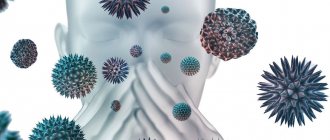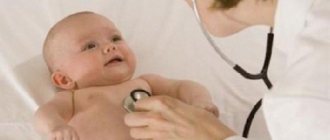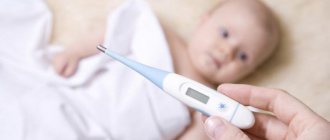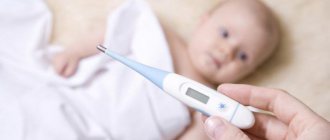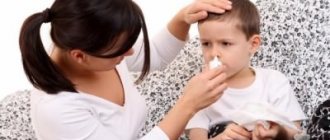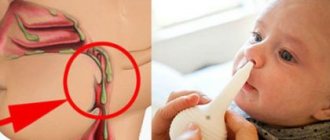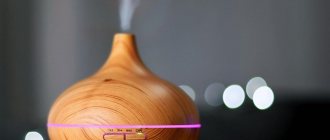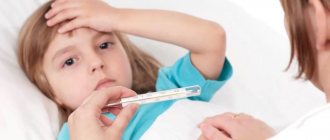Causes of cough in infants
There are many reasons for a baby to cough. The most common are:
- ARVI. In almost 90% of cases, cough in infants is the first sign of an incipient respiratory disease. During the daytime, the cough is mild, but in the evening and at night the symptom intensifies.
- Inflammation in the upper respiratory tract. A dry and persistent cough appears. It is very painful for a child.
- Dry indoor air. Because of it, a sore throat occurs, causing a cough. Installing a humidifier will help solve the problem.
- Otitis media or inflammation of the middle ear. The cough is a reflex. When pressing on the ear tragus, the child becomes restless, capricious, and cries.
- Entry of a foreign body. Life-threatening situation for a child. You need to tilt the baby's head forward and immediately call an ambulance.
- Polluted air outdoors or indoors. The baby's immature lungs react sharply to outside odors. Smoking and excessive gas pollution can trigger an allergic reaction in an infant.
How to treat a cough in a baby
A cough in an infant, like a cough in an adult, is a special reflex of the body to an external influence. A sharp expulsion of air is aimed at clearing the respiratory tract of phlegm and other foreign bodies.
In most cases, a cough manifests itself as a symptom of an infection in the body.
There are different variations of a child’s cough: from a slight, barely noticeable cough, to a painful cough, sometimes accompanied by pain in the respiratory organs and vomiting.
It is a mistake to think that a severe cough can be easily dealt with at home. Often such treatment leads to bad consequences. A mild form of the disease can be cured by purchasing several medications at the nearest pharmacy, but in case of a serious disease, neither a strong expectorant nor traditional treatment will help you.
The first signs of the need to treat cough in infants
It is necessary to treat a cough when it worsens the child’s well-being, sleep and condition. But don’t turn a blind eye to slight coughs. First of all, you should find out the cause of this disease in an infant. After all, treatment is aimed precisely at the very cause of the cough. There are various reasons:
- Inflammatory process of an infectious nature in the lower and upper respiratory sections (angina, viral infections, sinusitis, laryngitis, pharyngitis, tracheitis, pneumonia, bronchitis, etc.);
- Bronchospasm;
- Allergic inflammation of the respiratory tract and organs;
- Pulmonary edema;
- Obstruction, contamination, filling of the airways with foreign bodies, formations, liquids;
It is quite difficult to independently determine the cause of a child’s cough. Therefore, pediatrician intervention is necessary. It is he who will be able to accurately determine the cause and prescribe the correct treatment.
In this case, you will need some anamnestic data to help the doctor make a diagnosis: how long ago the cough appeared, the intensity of development of the cough, productivity and the effect of the cough on the general condition of the baby.
The doctor will also prescribe laboratory and physical tests (degree of mobility, viscosity, amount and type of bronchial secretion).
Cough medicines for infants
The cough can be dry or wet. When choosing antitussive drugs, consider this fact. For children with a strong gag reflex, expectorants are contraindicated in the case of a wet cough, which can only worsen the cough.
You should not use drugs aimed only at “quenching” the cough. After all, coughing is necessary because it removes phlegm from the body. Without a cough, all the excess fluid in the airways often leads to respiratory failure and pneumonia.
For wet coughs, it is recommended to use sputum thinners ( ASS, Lazolvan, Bromhexine,
Ambrobene, etc.). Basically, such drugs do not affect the cough reflex, but only promote the rapid removal of phlegm from the body. But the use of these drugs is limited in children under 3-4 years of age, because Children do not yet know how to cough up mucus.
For more effective treatment of cough in an infant, it is recommended to use drugs that soften and coat the throat. Such medications are sensitively reduced due to the anesthetics they contain (lidocaine, anesthesin, etc.). These drugs only reduce pain in the throat, but treat the cause itself.
Today on the medicine market there are no 100% safe and effective cough medicines for infants under 6 months.
There are only drugs containing medicinal substances extrapolated from doses intended for adults. But you cannot compare a mature adult and a 3-month-old child.
Treatment for children of such an early age should be radically different, and an experienced doctor will be able to help you in prescribing therapy.
The cause of a cough in a baby is most often the fact that phlegm (including saliva, the secretion of which increases during teething) gets onto the ligaments, passing along the back wall of the pharynx, and irritates them. If a child has a cough due to ARVI, it should be treated with plenty of fluids. This type of cough is self-limiting and can be easily treated even with folk remedies, but often manifests itself within a month.
Treatment of cough in infants at home
In folk medicine, there are various methods that help you cope with a cough and other symptoms of a cold in an infant on your own, and we will now consider them.
- For deep coughs, it is recommended to use mustard wrap. Take honey, vegetable oil, mustard and flour in equal proportions; stir, bring to a boil and apply to a cloth. Place the resulting cloth on the baby's chest and back with the mixture on the outside, and cover the top with a towel.
- Pour the salt heated in a frying pan into a rectangular rag bag (13x8 cm) and place it on the child’s chest and wrap it with a warm scarf. The bag should lie diagonally from the right armpit to the left shoulder. The child should stay with it for 2-3 hours until the salt cools down, and it is better to leave the scarf for a while longer to retain heat. This method is suitable for infants from 6-8 months.
- Onion juice helps soften a baby's cough. Finely chopped onion must be mixed with honey or sugar and let it brew for several hours, then give 1 teaspoon.
- Don't forget about herbs. For example, it is useful to brew chamomile tea and coltsfoot. This gentle method is suitable even for children from 2 months. Also, treatment with traditional methods is impossible without the use of inhalation with various herbs.
- Eucalyptus has long been known to speed up the healing of the respiratory tract. A deeper effect is obtained if you warm up the bath for 20-25 minutes, fill it with 10-15 cm of water and spray the eucalyptus tincture along the walls. After which you need to stay in the bathroom with the baby for 10-15 minutes, wipe the baby dry and wrap it in a warm blanket. The cough will begin to “fade out” after just a few procedures.
- Rubbing a baby with honey. Spread a small amount of honey on the back and chest of the child and rub until the hands stop sticking. Then wrap the child in warmth.
Folk remedies are not as fast-acting compared to modern drugs. Treatment sometimes lasts for more than one month to achieve a noticeable effect.
Do not forget about preventive procedures, seek help from a doctor in a timely manner and be attentive to your child. It is easier to use such measures than to treat your child in the future.
Cough in infants - symptoms and treatment of babies Link to main publication
Source: https://LechimKrohu.ru/simptomy/kak-lechit-kashel-u-grudnichka.html
How do cough medications work?
To treat different types of cough, three groups of drugs with different active ingredients are used:
- Antitussives. Suppress cough. They are used during dry paroxysmal severe cough, whooping cough in order to alleviate the child’s condition. The active ingredients of such drugs are: sodium butamirate, glaucine hydrochloride, oxeladin.
- Mucolytics. They dilute mucus, reduce its elasticity and viscosity. Prescribed for dry, non-productive cough (with sputum difficult to separate), usually in combination with expectorants. Active ingredients: ambroxol, carbocisteine, bromhexine.
- Expectorants. They are prescribed for a wet cough in a child to facilitate the separation of sputum by increasing its quantity and accelerating its movement through the respiratory tract. As a rule, extracts of medicinal plants are used. Babies may experience allergic reactions to some types of herbs, so expectorants should be used with caution and under the supervision of a doctor.
Important! It is prohibited to independently combine antitussive drugs with expectorants and mucolytics. If there is an excessive accumulation of sputum and there is no cough, pneumonia can quickly develop.
How to treat a cough in a 6 month old baby
The occurrence of a cough in a small child always causes concern among parents. They are in a hurry to start treatment before determining the causes of the cough, which is not always effective. Small infants have reduced immunity, so even a simple cold is fraught with danger, but drugs that are given to a child without a doctor’s permission can be no less dangerous.
Causes and signs of cough in a child at 6 months
There are many reasons that can trigger the development of cough in a 6-month-old child.
A cough in an infant can be either a sign of a dangerous disease or a normal physiological phenomenon. In any case, parents of a sick child should consult a doctor before treating a cough in a 6-month-old child.
The signs of a cough are obvious and well known. The baby makes barking sounds when the pectoral muscles reflexively contract and push out air.
Dangerous signs are blue discoloration, severe suffocating cough, constant crying of the child, sputum discharge from the mouth and nose mixed with pus or blood. In this case, you should immediately call a doctor.
Cough is a defense mechanism of the body, so blocking it with antitussives is not always correct or safe.
It is worth remembering that it is not the cough itself that needs to be treated, but the cause that causes it (infection, allergic reaction, etc.):
- Physiological reasons. Coughing in an infant is common. A baby doesn't always cough because of a cold. Even with thorough cleaning, dust particles and pollen constantly hover in the room, which enters the child’s lungs and causes a cough. This reflex cough often occurs after sleep. Teeth may also be a cause of coughing. A physiological cough is always short-lived and is not accompanied by other symptoms except drooling during teething.
- Infection. In the first years of life, many children suffer from ARVI. We are used to thinking that a cold goes away on its own, but a small child with reduced immunity is always more likely to have complications than an adult.
- Entry of a foreign body. A small child may choke on a piece of a toy or a piece of food. In this case, the cough will be strong, unexpected and suffocating. In this case, it is recommended to place the child face down on your knee and hit between the shoulder blades with a precise movement. Then pull the piece out with your finger and call a doctor.
- Other diseases. Sometimes a cough has nothing to do with infection or the respiratory tract. Cough can occur due to heart disease or poisoning.
Drug treatment of cough
The correct treatment for an infant’s cough should be prescribed by a doctor, depending on the type of cough and the cause of its occurrence.
The list of drugs acceptable for the treatment of young children is limited. Not all medications are safe to give to a child due to the increased likelihood of side effects.
Cough medications have different compositions and effects. Some relieve the cough reflex, others relieve inflammation, and others remove phlegm. Only a pediatrician can determine which drug and in what dosage will be more effective. Even despite the information in the instructions, drugs allowed for the treatment of children from 6 months are prescribed with caution and in a dosage determined by the doctor.
Medicines for children 6 months:
- Bromhexine. This is a mucolytic agent that is available in the form of tablets and syrup for children. The drug actively dilutes sputum, enhances secretory activity, which promotes the removal of sputum from the bronchi. You should not expect an antitussive effect, since Bromhexine does not relieve cough, but removes phlegm and speeds up recovery.
- Ambroxol. Ambroxol syrup is also a mucolytic. It is considered less toxic and more effective than Bromhexine, so it is more often prescribed to children. It actively thins mucus and improves its elimination, and is indicated for wet coughs.
- Stoptussin. Complex antitussive drug, available in drops. It not only eases the cough reflex, but also accelerates the removal of sputum due to its mucolytic effect. The drug is prescribed to children from 6 months and adults for dry cough. The dosage is determined depending on body weight.
- Lazolvan. The drug is used in the form of syrup orally or for inhalation. It has an expectorant effect and is very effective for wet coughs. Often prescribed for pneumonia, bronchitis, asthma, as well as wet cough of other etiologies.
It is worth remembering that mucolytic and antitussive drugs are not recommended to be combined, since the former increase the amount of sputum, and the latter do not allow it to be excreted, increasing inflammation in the lungs.
Traditional methods
The best folk advice for treating cough in infants
Traditional cough recipes cannot be considered absolutely safe when treating a child. Young children often experience allergic reactions to essential oils, juices, and herbs, so they should be used carefully, starting with small dosages.
It is also worth remembering that all children are different. What works for one child may cause an allergic reaction in another.
Traditional cough recipes:
- Mustard wrap. Mustard is often prescribed to children under one year of age, but it is important not to overdo it. One tablespoon of dry mustard is dissolved in 0.5 liters of water. Then moisten gauze or film in the solution and wrap the child. This wrap lasts only 2-3 minutes, after which the child must be turned around, washed with clean water, wiped dry and dressed warmly. Such warming methods should not be used if the child has a fever.
- Onion juice. Onions rarely cause an allergic reaction, but it is important to maintain concentration so as not to cause a burn to the mucous membrane. Finely chop or grate the onion, mix with honey in equal proportions, leave for no more than 2 hours, then drain the juice. Give the child half a teaspoon of this juice. Can be diluted with water. If your child develops a rash, honey is most likely the cause of the allergy.
- Herbal decoction. Doctors allow the use of herbs in children older than 2 months. It is worth paying attention to the presence of seasonal allergies in the mother. If there is a suspicion of an allergic reaction, it is better to refuse such treatment. Coltsfoot and plantain help with coughs. The mixture of herbs is infused in boiling water for about 2 hours and then given to the child on a spoon. Don't expect your cough to go away right away. This is an expectorant, it removes mucus, so the cough may even get worse or become wet.
- Rubbing. Small children can be rubbed with badger fat, paying special attention to the chest and neck. After such rubbing, it is advisable to insulate the neck for a while.
Rules for inhalation with a nebulizer
The effectiveness of nebulizer inhalations depends on the rules for using the device, which mothers should know!
The nebulizer is very easy to use and safe even for a small child. A portable nebulizer allows drugs to penetrate directly into the respiratory tract without entering the stomach or blood, which makes such inhalations especially effective.
Source: https://dou99.ru/kashel-u-detej/kak-lechit-kashel-u-6-mesyachnogo-rebenka
What medications can and cannot be given to a child for a cough?
Those drugs that are available only in tablet form are prohibited for use in early childhood. For example:
- glaucine hydrochloride (Glauvent tablets);
- prenoxdiazine (“Libexin”).
A safe and acceptable form for children is drops and syrups with a low concentration of the active substance. Typically, drops and syrups for infants are diluted in water, tea or juice.
Some syrups cannot be used until two years of age or older, for example, the antitussive drug “Bronholitin”, “Gerbion” syrup for dry and wet coughs, “Erespal” syrup. Until two years of age, antitussive drugs containing narcotic substances: codeine and dextromethorphan are contraindicated for use.
Is it possible to give a child under one year of age Mukaltin cough tablets?
The tablets are intended for adults and older children. However, pediatricians, despite the restriction in the instructions for up to a year, consider it possible to give some tablets based on extracts of medicinal herbs to babies earlier.
Such tablets include “Mukaltin”, which contains marshmallow extract. The daily dose for a child under one year of age should not exceed two tablets. At one time, half a tablet is given, previously dissolved in a tablespoon of boiled water.
What can you give a child from two months to a year for a dry cough?
Antitussives
Drops "Codelac NEO" (Russia). Active ingredient: butamirate. For children from two months, 10 drops 4 times a day.
Analogues:
- drops "Panatus" (Slovenia);
- drops "Sinekod" (Switzerland).
Stoptussin drops (Czech Republic, Israel). Active ingredient: sodium butamirate in combination with guaifenesin. Children weighing less than 7 kg are given 8 drops 3-4 times a day orally, children weighing 7-12 kg 9 drops 3-4 times a day orally.
Means for converting a dry cough into a wet one
Bromhexine syrup 4 mg/5 ml (Russia) . Active ingredient: bromhexine. Children under 2 years of age: 2 mg (2.5 ml) 3 times a day.
Analogs: Bromhexine 4 Berlin-Chemie solution (Germany).
Solution for oral administration and inhalation "Ambrobene" 7.5 mg/ml (Germany, Israel). The active ingredient is ambroxol. For children from birth to two years of age, 1 ml orally three times a day. Children under two years of age: for inhalation, 1 ml of solution mixed with saline according to the instructions, once or twice a day.
Analogues: oral solution "Bronchoxol" 7.5 mg/ml (Russia).
Ambrobene syrup 15 mg/5 ml (Germany, Israel). The active ingredient is ambroxol. Children from birth to 2 years: 2.5 ml twice a day (15 mg ambroxol per day) after meals.
Analogues:
- syrup "Bronchoxol" 3 mg/ml (Russia);
- Lazolvan syrup 15 mg/5 ml (Germany, Spain);
- Flavamed syrup 15 mg/5 ml (Germany);
- syrup "Halixol" 30 mg/10 ml (Hungary).
Syrup "Mukosol" 250 mg/5 g (Israel). The active ingredient is carbocisteine. The normal daily dose of carbocysteine for children is considered to be 20 mg/kg body weight, distributed 2-3 times. For children under 3 years of age, the dose is determined by the doctor depending on body weight.
Granules for the preparation of ACC syrup 100 mg (Germany). The active ingredient is acetylcysteine. Allowed from 10 days of age under medical supervision. Children under two years of age are allowed to take no more than one to one and a half sachets (100-150 mg) in one day, divided into 2-3 doses.
Important! Taking mucolytics is not recommended before night or daytime sleep to avoid sputum stagnation.
What can you give to a child from two months to a year for a wet cough?
Expectorants
- Syrup "Bronchipret" 50 ml (Germany). Ingredients: thyme herb extract, ivy herb extract. Children from 3 months to 12 months: 10-16 drops 3 times a day.
- Syrup “Licorice Root” (Russia). Based on licorice root extract. Children under two years old: 1-2 drops three times a day.
- Dry cough medicine for children (Russia). Based on dry plant extracts. Dissolve the contents of the package in 1 tbsp. l. boiled water. Give 15-20 drops to children under one year of age.
- Ammonia-anise drops (Russia). Active ingredients: anise oil, ammonia solution. Children under one year old: 1-2 drops three to four times a day.
- Syrup "Bronchicum S" (Germany). Based on thyme herb extract. For a child from 6 months to 12 years - 1/2 teaspoon (2.5 ml) 2 times a day.
- Syrup "Prospan" (Germany). Based on ivy leaf extract. Approved for use by infants from birth. 2.5 ml of syrup twice a day is recommended.
Important! Children under two years of age should take medications in the form of syrups and cough drops under the strict supervision of a doctor. The list of drugs is provided for informational purposes. You cannot prescribe medications to newborns yourself, since some children are allergic to the components of syrups.
Cough in a child - advice from a pediatrician to parents
After the fact
Finally, it should be emphasized once again that fighting a cough alone is not only meaningless, but is also dangerous for the child. Randomly taking different medications and changing medications if the results from their use do not appear instantly are absolutely unreasonable actions that are harmful to the baby’s health. After all, it may turn out that you just need to cover the radiators or remove a new flower from the room, or check whether the baby is allergic to the wool in the blanket.
In any case, it is necessary to find out the cause of the symptom, and only then act on it comprehensively. This is the only way to cure both the cough and the disease that caused it.
Author: Yulia Zablotskaya
Sources: medscape.com, health.harvard.edu, medicalnewstoday.com.
Source
A child’s cough worries not only the baby, but also his parents, who strive to help their son or daughter in every possible way. Some begin to use folk recipes on the advice of relatives, others go to the pharmacy for syrup, and some do inhalations. Let's figure out whose actions are correct in the opinion of a specialist, and how the popular pediatrician Komarovsky advises treating a cough.
What can you give a month old baby for a cough?
As a rule, cough in 1-month-old children is associated with an inflammatory disease of the respiratory tract. In such cases, medications for treatment are prescribed exclusively by a doctor. When prescribing mucolytic drugs, the severity of the cough reflex is taken into account, since in premature infants and those with neurological disorders, their use can cause stagnation of sputum in the bronchi and aggravate the course of the disease.
Some therapists recommend giving Stodal homeopathic cough syrup, which has no age restrictions. However, as practice shows, the effect of its use is questionable. Like all homeopathic remedies, this syrup has a very low concentration of active ingredients and is able to “treat” only due to the “placebo” effect, which is simply not yet possible at such an early age.
How to treat cough in infants with various diseases
Coughing in infants is much less common than in older children. If your baby is breastfed, the risk of getting ARVI or influenza is even lower. What is important? If a cough is accompanied by a runny nose and fever, this is a sure sign of ARVI.
If the nose does not run, there is no fever, and the infant is coughing, this may indicate an allergic nature of the cough or whooping cough. Treatment of cough in children under one year of age can only be prescribed by a doctor. Even if your baby coughs, you should definitely see a pediatrician. In infants, the respiratory muscles are poorly developed.
Inflammatory processes during ARVI can result in complications due to stagnation of mucus in the bronchi and lungs, because the child is unable to cough it up.
About dry and wet cough
Coughing, like sneezing, is a protective reflex of the body. Normally, a baby can cough up to 10 times a day and be absolutely healthy. A slight cough in infants may be a physiological norm.
- Dry cough in a baby. The reasons for it can be very different. Therefore, sometimes difficulties arise in making an accurate diagnosis. A dry cough can be the beginning of an acute respiratory viral infection. And at the same time, it is characteristic of the first weeks of whooping cough and parawhooping cough. It may be a symptom of allergies or bronchial asthma (alas, it also occurs in infants). Sometimes the cough seems dry to the mother, but the doctor comes, listens and says that it is wet. The fact is that a 3-month-old baby still does not know how to spit out mucus and swallows it.
- A wet cough in an infant without fever. Indicates the productive nature of the cough. It usually appears during the recovery stage after ARVI. If clear liquid mucus is coughed up, then there are no complications. Greenish and yellowish sputum indicates a bacterial infection in the respiratory system. Sometimes a prolonged wet cough without fever can indicate chronic bronchitis, tracheitis, or pneumonia.
The bronchi have the property of self-cleaning. Cough in a newborn, as in a 5-month-old baby, may be associated with the immaturity of this function. It also often occurs when mucus runs down the back of the nasopharynx and irritates it.
What the doctor can prescribe
How to treat a cough in an infant? The treatment regimen depends on the disease. What can a doctor prescribe if a baby has signs of ARVI?
- Antiviral drugs. Immunomodulatory drugs with antiviral effects are often prescribed. Viferon is most often used in candles, which has no age restrictions. It can be given to newborns.
- Nasal rinsing. An important procedure, especially before bedtime. If a baby has a clogged nose, he breathes through his mouth. This leads to rapid drying of the mucous membranes, which then intensifies the baby’s cough. You need to rinse the nose with saline solutions. You can use regular saline solution: drop 3 drops into each nostril, at least every hour. After rinsing, you can instill 1 drop of the “Ectericide” oil solution, which will cover the mucous membranes with a thin protective layer. It is strictly forbidden to instill antibacterial drops. In rare cases, the pediatrician prescribes vasoconstrictor drugs for the nose. Usually they are not used for ARVI.
- Antipyretics for fever. Syrups based on paracetamol and ibuprofen are used.
- Homeopathic medicines. Widely used in modern pediatrics in the treatment of ARVI in children of different ages. Homeopathic syrup "Stodal" is popular. It has an expectorant, bronchodilator, and mild antitussive effect. It is prescribed for dry and wet coughs; it also relieves bronchospasms well.
With ARVI, a baby sometimes has a cough and runny nose without fever. Also, these symptoms can be observed with allergic rhinitis, laryngitis, pharyngitis.
Read more about cough medicines
How to treat cough in a child under one year old? There are three large groups of drugs for treating cough. The most acceptable and safe dosage form for infants is syrups and drops.
- Antitussive drugs. They suppress the cough reflex and are used for dry, obsessive, paroxysmal cough in children, more often for whooping cough. Most of these medications are contraindicated in children under 2–3 years of age. Sinekod syrup is a drug with central non-narcotic action, approved from 2 months. Panatus syrup is also a drug of central non-narcotic action, approved from 6 months under strict medical supervision. The dosage is prescribed depending on body weight.
- Mucolytic drugs. They may be based on the following substances: ambroxol, bromhexine, acetylcysteine, hydrochloride. Helps thin out thick mucus in the respiratory system. The most well-known trade names of syrups: “Lazolvan”, “Ambrobene”, “Bromhexin”, “Mukosol”, “Fluditek”, “Flavamed”, “Mukodin”. Most of these drugs can be given to infants, but strictly as prescribed by a doctor.
- Expectorants. Prescribed for wet cough, when viscous mucus is difficult to cough up. Herbal expectorant syrups with ivy and plantain extract are considered to be the safest for children under one year of age. The preparations may also include: thyme, anise, licorice, marshmallow, elecampane, oregano, thyme, wild rosemary, coltsfoot and other herbs. However, allergic reactions may occur to them. It is necessary to monitor the child's condition. If a rash, swelling, or anxiety appears, you should stop treatment and consult a doctor. The most well-known trade names: “Gedelix”, “Doctor MOM”, “Prospan”, “Bronchicum”, “Dr. Theiss." “Prospan” syrup, for example, can be given to a baby at 4 months, “Bronchicum” can be safely used at 7 months. It is acceptable to use expectorants at an earlier age, in newborns. This is decided only by the doctor, who accurately calculates the dose of the medicine.
An overdose of herbal expectorants should not be allowed, because this will lead to a lingering cough. The volume of sputum may increase, and the baby will not be able to cough it up.
A combination of expectorants and antitussives is considered dangerous. They are not compatible. Most instructions for expectorant syrups warn about this.
Suppression of the cough center and the formation of excess sputum result in pneumonia.
What should parents do if their baby coughs?
- Drink as much as possible. If a newborn coughs, then at that age you should not give anything other than water. The ideal option is breast milk. If your baby has a fever, dehydration occurs much faster. This must be taken into account. How can you tell if your baby is getting enough fluids? By filling the diaper. If urination occurs once every 4 hours, this is a signal that the baby needs to be hydrated. In addition to water, an 8-month-old baby can be offered dried fruit compote, non-concentrated juices, decoctions of linden, rose hips, and raisins.
- Don't dress too warmly. The child will lose even more moisture, and the mucous membranes will dry out faster.
- Be outdoors as much as possible. If a baby has a cough without fever, and the child feels well, there are no contraindications for walking (except for severe frost outside the window). After walking, the baby may begin to cough more severely. There is no need to be afraid of this, because when the cough intensifies, the phlegm comes out better.
- Humidify the air in the baby's room. An important condition for a dry, non-productive cough to become a wet, productive cough without any medications. Air humidity should be from 50 to 70%. Air temperature is no less important. Ideally it should be 18°C. At temperatures above 22°C, the mucus in the respiratory organs quickly becomes thick and viscous.
- Natural inhalations. Infants are prohibited from doing steam inhalations for safety reasons, so as not to accidentally burn the skin and delicate mucous membranes of the respiratory tract. You can install an ultrasonic humidifier next to the crib. During attacks of dry obsessive cough, it is recommended to go into the bathroom with the baby. You need to fill the bathtub with hot water, add soda to it and breathe in the steam that fills the bathroom. The humidity in the bathroom will be very high, which is useful for dry coughs. If the cough is wet, then it is better not to add soda.
- Water procedures. Is it possible to bathe a child with a cough? It depends on the nature of the disease and the general condition of the baby. In the first days of ARVI, when the temperature is elevated, it is not recommended to bathe the baby; you can only wipe the body with a damp towel. When the baby's condition improves, you can take a medicinal bath. You can add decoctions of medicinal herbs (pine needles, eucalyptus, chamomile, wild rosemary and others) and sea salt to the water. After water procedures, babies usually begin to cough up the remaining sputum well.
- Drainage massage. Indicated for wet cough with difficult to separate sputum. It helps well in infants whose respiratory muscles are poorly developed. How to carry it out? If possible, you should invite a professional massage therapist who works specifically with infants. But there are some things mom can do herself. You need to lay the child on his back, clasp his chest with his palms and perform stroking movements from bottom to top. Then turn the baby over on his stomach and stroke his back in a circular motion without touching the spine. After stroking, more intense patting movements are performed from bottom to top. It is better to lay the baby so that the buttocks are higher than the head.
- Folk remedies. Pediatricians do not recommend resorting to traditional recipes if the baby is coughing. Wrong and thoughtless actions of parents sometimes lead to disastrous results. It is strictly forbidden to use compresses with vodka, vinegar, or dry mustard. The baby may get burns, poisoning, and spasms of the larynx and bronchi may occur. Also, decoctions and infusions, and breast preparations should be used with great caution. Young children are often allergic to medicinal herbs.
Against the background of ARVI, an infant may develop acute bronchitis or pneumonia, secondary bacterial infections. The baby will have to be treated with antibiotics and many different medications. They are not advisable during the formation of the immune system. Also, when pneumonia was suffered at 2 months or earlier, the alveoli of the lung are affected, which will remain undeveloped in the future.
What to do from the first days of a cough in a baby
If a one-year-old child develops a cough that is not caused by physiology, you should immediately call a doctor. Self-prescribing medications is prohibited. What can a mother do in the first days of a child’s cough?
- Monitor the air temperature in the room. It should not be higher than +22C. It is necessary to regularly ventilate the apartment. If the cough is not accompanied by a fever, you can take your child for a walk outside.
- Humidify the indoor air using a humidifier with a hygrometer. Control the humidity level; it should be between 40 – 70%.
- It is enough to give the child something to drink. Breast milk, tea, compote, water will do.
- Change the position of the baby in the crib more often, or carry him in your arms.
- A 6-month-old child who has a cough with difficult sputum is recommended to have a drainage massage. The doctor will show you how to do the exercises.
- You can rub your baby's chest and feet with animal fat (for example, badger fat). Ointments containing camphor and menthol are prohibited for children under 2 years of age.
Main types of cough
Several types of cough are typical for an infant:
- unproductive or dry - it occurs in cases where thick mucus accumulates in the baby’s respiratory tract, and the child cannot cough it up on his own.
- productive or wet - the sputum has lost its viscosity and part of it can be coughed up well.
These main types of cough most often accompany inflammatory processes in the respiratory system. They can be caused by a viral or bacterial pathogen. Therefore, it is impossible to cure a cough without eliminating the causes that cause it. In the case when parents begin to treat a baby’s cough on their own, it is still advisable to show it to a doctor after 2-3 days.
Once the diagnosis is clarified, treatment will be more effective.
What can you give your child if he has a severe cough?
- It is necessary to determine the cause of the cough (bronchitis, pneumonia, laryngotracheitis).
- Indicate the type of cough (wet, dry, with fever).
- Increase the volume of fluid consumed.
- Use antitussive drugs in drops “Panatus”, “Sinekod” (strictly as prescribed by a doctor) for a severe dry cough. Prescribed from 2 months of age, 10 drops - 2 r. per day.
- For a wet, strong cough, expectorants and mucolytic drugs are used (Lazolvan, Ambroxol, Ambrobene, Thermopsis, Flavamed). Age restrictions and recommended doses are described above.
- The chest is rubbed with warming substances (badger fat).
What antibiotics can be given to infants for a cough with fever?
The cough itself is not an indication for antibiotic therapy. If it is accompanied by an increase in temperature, the bacterial nature of the disease is assumed. In such cases, the doctor prescribes antibiotics.
Infants are prescribed injectable antibiotics, as well as drugs in the form of a suspension. Most antibiotic suspensions are contraindicated in children under 6 months of age. Amoxacillin, Amoxiclav, and Sumamed are considered relatively safe. The dosage is prescribed depending on the complexity of the infectious disease and the child’s weight.
Important! Tetracycline antibiotics are strictly prohibited for young children. They have a destructive effect on tooth enamel; children’s teeth initially grow weak.

